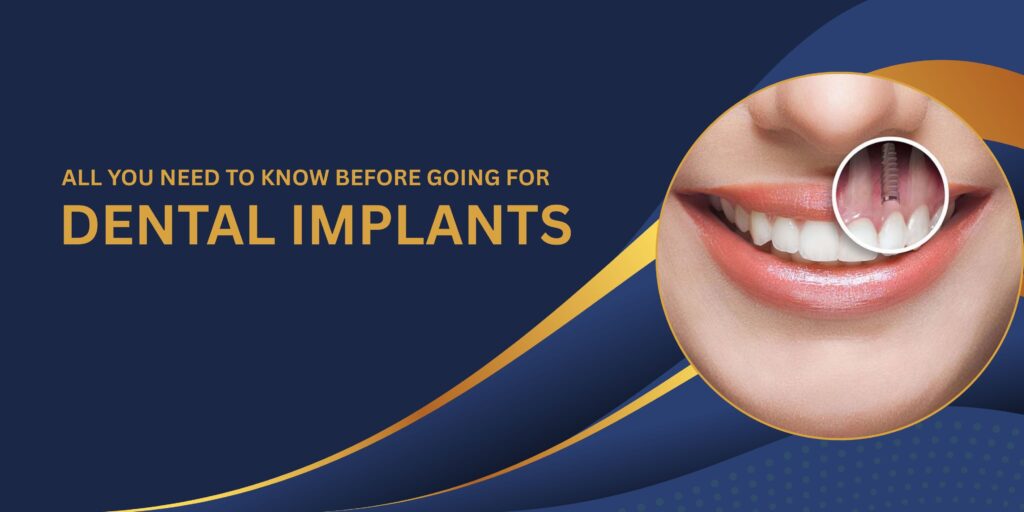Dental implants – understanding the basics
In the simplest words you can say dental implants are tiny threaded posts that permanently replace your lost or missing teeth. These are surgically placed into your jawbone. The treatment involving dental implants is invasive in nature. Unlike any other solution to missing tooth or teeth, dental implants not only fill up the gaps in your smile to provide better aesthetics but also contribute to overall functionality of a tooth including improving its chewing and speech abilities and enhancing your overall oral health. Once the wound resulting from the surgery heals up completely, your implant works just like your lost natural teeth.
Different parts of a dental implant
A dental implant has three typical parts – namely
- Threaded post – Imagine an artificial root of a tooth and that is what it is all about. Your dentist performs a surgery to place it into your jawbone.
- Abutment – It is nothing but a connector post, tiny is size. It is screwed into the threaded post and extends little beyond the gum and acts like a foundation of your new artificial crown or tooth.
- Restoration – Any kind of prosthetic which repairs or replaces the natural teeth is a dental restoration. Commonly used dental restorations in the implants treatment are dentures, bridges and crowns.
Usually dental implants are made from titanium although some are ceramic. A dentist who offers full mouth dental implants at reasonable cost in the UK assures both titanium and ceramic are biocompatible and are safe to use from the aspect of health.
In course of time, missing teeth take a toll on both your oral and mental health. People, who have missing tooth or teeth, especially those at the front of the mouth, tend to develop the habits of deliberately avoiding social situations and covering the mouth while laughing. Dental implants not only fill up the gap in your jaw line caused by your missing or lost tooth or teeth but also restore your smile and confidence.
Common reasons for tooth loss
Some of the common reasons that lead people to tooth loss include the following –
- Cracks in the tooth resulting from trauma
- Gum disease
- Cavity
- Bruxism or clenching and grinding of the teeth
- Anodontia or the teeth that never come out
About dental implants procedure
The surgery that is conducted to place an implant post into the jawbone is more of a personalised procedure varying from patient to patient. The surgical procedure is not the same for every patient. However the overall procedure can be broadly divided into three steps like –
- Surgical placement of the implant post into the jawbone of the missing tooth or teeth
- Allow time for the surgical wound to heal up completely
- Attachment of the post and the final crown, denture or bridge as is suitable in a given case
About dental implant surgery
Dentists who offer dental implants in Chelsea explain the surgical procedure to insert an implant post into the jawbone of a patient involves the following steps –
- Anaesthesia is administered on a patient before the surgery. As a result the entire gum area becomes numb. If a patient opts for sedation then those medications are also provided at this stage.
- In the next step your dentist or oral surgeon makes a cut or incision in your gum to expose the bone structure underneath.
- Once your jawbone is exposed, the dentist makes a tiny hole in the jawbone. A range of specialised instruments is used to achieve this step successfully. The hole is left wide just to the size to fit the implant post in.
- The next step involves placing a dental implant post into the jawbone. This is done with utmost care and precision for obvious reasons.
- At this stage of the treatment the last step involves closing up all bone structures and the incision. This is done with stitches.
If your implant is to fill up any gap at the front of the mouth then your dentist will place a temporary tooth while the surgical wound keeps healing up on its own, explain dentists who offer easily affordable and cheap implants in London. Thus there is no gap in your jawbone while you smile even though your implants treatment is not complete.
If the implant is placed anywhere at the back of your mouth then probably your dentist will not provide you with any temporary tooth on stopgap basis.
Healing phase of the treatment (also called osseointegration)
As your wound heals the jawbone gradually gets fused to the implant post. This is the actual phenomenon involved in this treatment. The process of fusing of your jawbone with the implant post is called osseointegration. The phenomenon usually takes anywhere between three to nine months under normal circumstances. In many cases the healing takes much longer, explain dentists who charge reasonable cost for dental implants across the UK.
Placement of abutment tooth and the final restoration
Once the surgical wound completely heals, they attach an abutment, which is a tiny connector post. You also get your final restoration at this stage which could be crown, bridge or denture.
Cost of dental implants
The average cost of dental implants in the United Kingdom usually ranges from around £2500 to £4500. Restoration of the full mouth with implants costs anywhere between £15000 and £30000 for each arch. The cost varies on number of factors including the number of implants required, the material an implant is made up of, complexity involved in a case, experiences and success rate of a dentist and others.
At Dental Clinic Chelsea, we are committed to providing top-quality dental implant solutions tailored to your individual needs. Our experienced team uses the latest technology and premium materials to ensure long-lasting results and patient satisfaction.
Read Also: Invisalign Clear Aligners: Key Facts for Informed Choice


